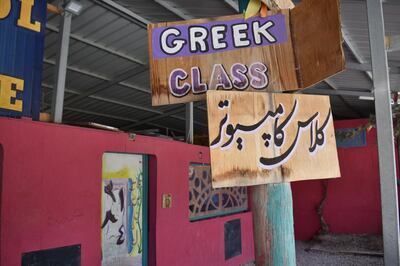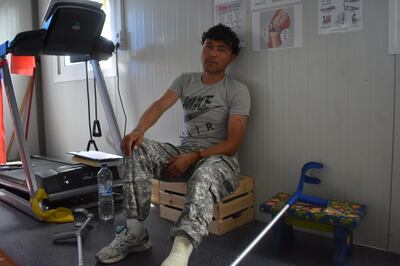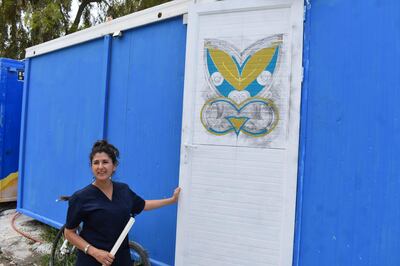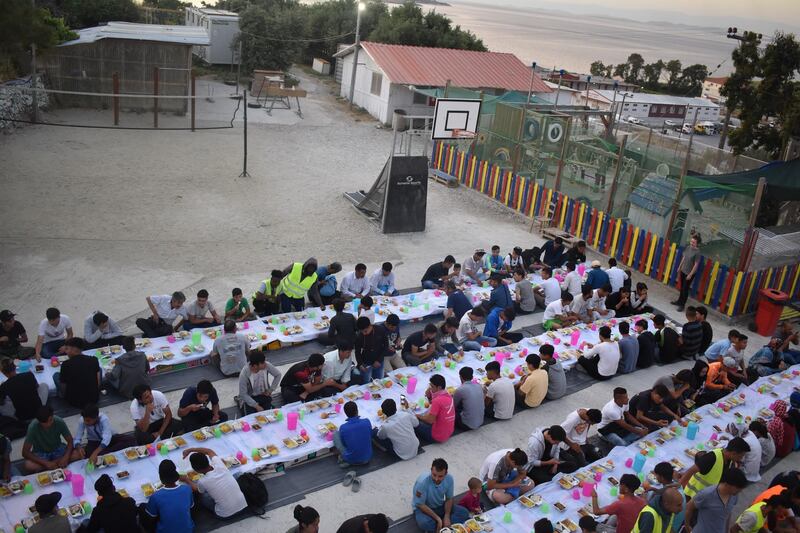“This place is like my home. When I’m here, I’m happy,” African refugee Rahman says at a community centre for refugees on the Greek island of Lesbos.
Rahman has just been appointed one of the directors of the adult school in the centre, founded by Swiss NGO One Happy Family. The centre, which recently celebrated its second birthday, has an average of 800 visitors per day from Lesbos’s two migrant camps, Moria and Kara Tepe.
Unable to leave the island for the mainland or elsewhere in the EU, almost 7,000 people hoping to make a better life for themselves in Europe stay in camps on the tiny island, in the northern Aegean Sea, while they wait for their asylum applications to be processed.
With a population of more than twice its capacity, Moria is the worst of the two camps. The extreme overcrowding, frequent outbreaks of violence and lack of basic necessities such as hot water, electricity or a functioning sewage system has drawn international condemnation. There are instances of refugees who have fled unimaginable horrors in their home countries committing suicide in the camp.
Rahman is one of Moria's 4,700 residents. He agrees to speak with The National on the condition that his real name is not revealed, fearful that this might affect his asylum application. Rahman is from an African country, which also will not be named, that is not at war. However, he was not safe there and fled to Turkey, arriving in Lesbos in November 2018 on a migrant boat.
“It wasn’t an easy journey to make. I wouldn’t advise anyone to do it,” he warns. “But when you look at some of the challenges some of us have, it’s the only option.”
Rahman decided to try to reach Europe as a last resort because there were no opportunities for him in Turkey. Unable to gain asylum, he worked illegally until he had earned enough money to pay people smugglers to allow him on to a boat headed for Greece. But on his first attempt he was arrested and put in a detention centre for a year. A controversial deal between Turkey and the EU in 2016 designed to cut down the number of illegal crossings to the Greek islands has led to many refugees being detained in prison-style centres.
“For over a year nobody knew where I was to make a phone call, to write a letter,” he says. “Nobody knew my situation.”
While Moria is hardly an ideal home, Rahman has made OHF his focus. He began as a visitor, using the centre’s gym to train before being offered a security guard position by the charity. He started helping out at the adult school, which teaches English and Greek to refugees, and was eventually asked to apply for the role of school co-ordinator.

Maryam, a 26-year-old former housewife, tells The National she spent a month at Moria when she arrived from Turkey before being moved to Kara Tepe. Maryam left Kabul with her husband and baby daughter two years ago. Estimates vary, but it is thought that up to 90 per cent of the refugee population in Lesbos is now from Afghanistan. Maryam and her family first tried to live in Iran where, like many Afghans, they were treated as second-class citizens. Their experience in Iran and later in Turkey was so bad that she decided to make the perilous crossing on a boat to Greece.
“We tried two times. The first time, the boat got a hole and I don’t swim. My husband held me, my daughter and our bags until we got to Izmir in Turkey,” Maryam recalls.
“The second time, we got to Greece. But the weather was very bad – the sea was moving and jumping. Every second I thought I was going to die. You have your life in your hand.”
Like Rahman, Maryam has been appointed as a co-ordinator of the adult school, which has nine classrooms painted in bright colours. She speaks English well and is always on hand to help other refugees at the centre, from acting as an interpreter to organising bike rentals.
While Maryam enjoys working at the centre, she longs to have a permanent place to live. Kara Tepe is better than Moria but living in a container with no hot water and limited electricity is not the future she anticipated for her three-year-old daughter.
“I want my daughter to be in a country where she can go to school and get an education,” she says. “I don’t want a very good life, just a normal life. She deserves that.”
Alongside the adult school and the gym, the centre has a shop, a cyber cafe, a bike repair shop, a school for children, a playground, a barber, a yoga and martial arts studio, a women’s area and a media centre. Some of the centre’s facilities are funded by some of the 90 other NGOs operating on the island. The UK-based charity Help Refugees has sponsored an iftar twice a week at the centre, providing meals for 500 people.

Swiss national Nicolas Perrenoud, a long-term member of OHF, explains to The National during the iftar that the centre is mostly reliant on private donations.
“We want to make the centre financially sustainable for the long term. People often agree to pay for a piece of equipment. But often paying for things that we really need like electricity for the building is not so sexy,” he says.
Until earlier this month, remedial therapist Fabiola Velasquez was based at the centre, helping rehabilitate refugees with injuries often sustained in their home countries. Ms Velasquez, who is Chilean and whose husband is a Lesbos local, has since set up a physiotherapy centre in a container in Kara Tepe. The container was donated by a “lovely lady from New Zealand”, Ms Velasquez says.

Inviting The National into the container, Ms Velasquez introduces one of her patients, Afghan refugee and Moria resident Sohrab, 25. Using a Farsi interpreter, 18-year-old Abass – also a Moria resident – Sohrab says he was injured five years ago in Afghanistan while working as a driver for an American company. The Taliban attacked the car with a bazooka rifle, injuring both of his legs. He had two operations in Afghanistan to place metal plates inside his right leg, but now they need to be removed.
“Because of the environment in Afghanistan, the operation was not so good,” Ms Velasquez says. “The plates need to be removed. I have found a doctor who is willing to operate but the operation is in Athens and will cost 3,000 euros (Dh12,300).”

In Kara Tepe, where the population does not exceed 1,250, there is space for wide, sloping paths designed to make it easier for people with disabilities to move around. But in Moria, the hilly terrain with tents squeezed next to each other makes getting around a challenge. As a single Afghan man, it is unlikely Sohrab would be able to move to Kara Tepe, which prioritises families. Syrians and Iraqis were recently moved there after fighting broke out between Arabs and Afghans in Moria.
Sohrab recently sprained his left ankle in Moria, where residents have to queue two hours for food every day, leaving him reliant on crutches to get around.
“The nature of his injury means he lacks mobility; he twists himself and injures himself further,” Ms Velasquez explains.
“He is young, he will be able to recover with the corrective surgery. I want him to be able to walk properly one day and give him a better life.”







